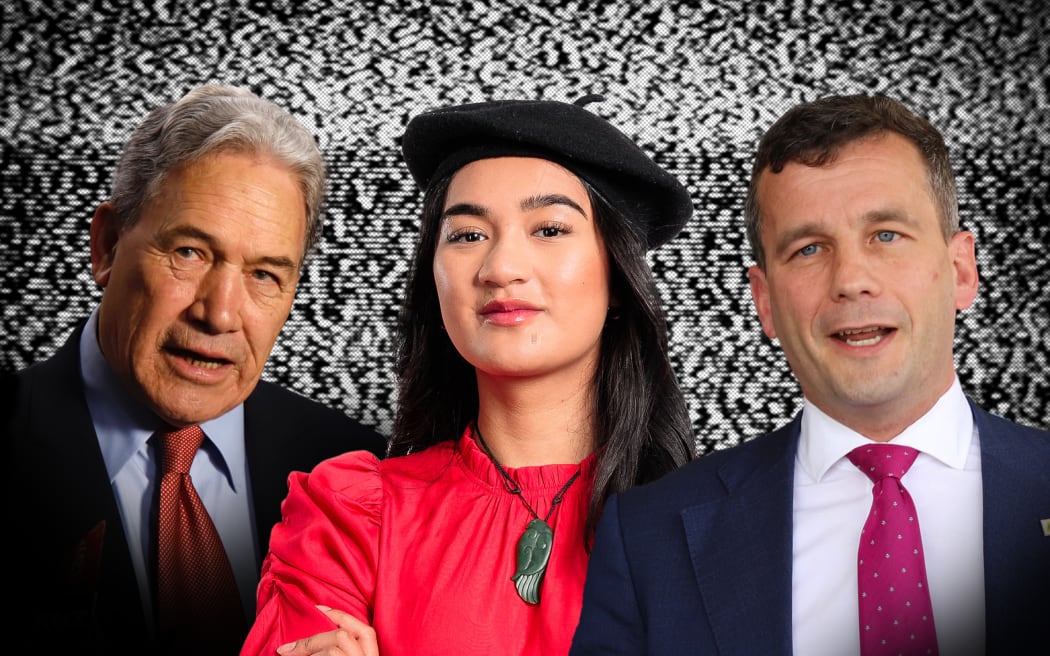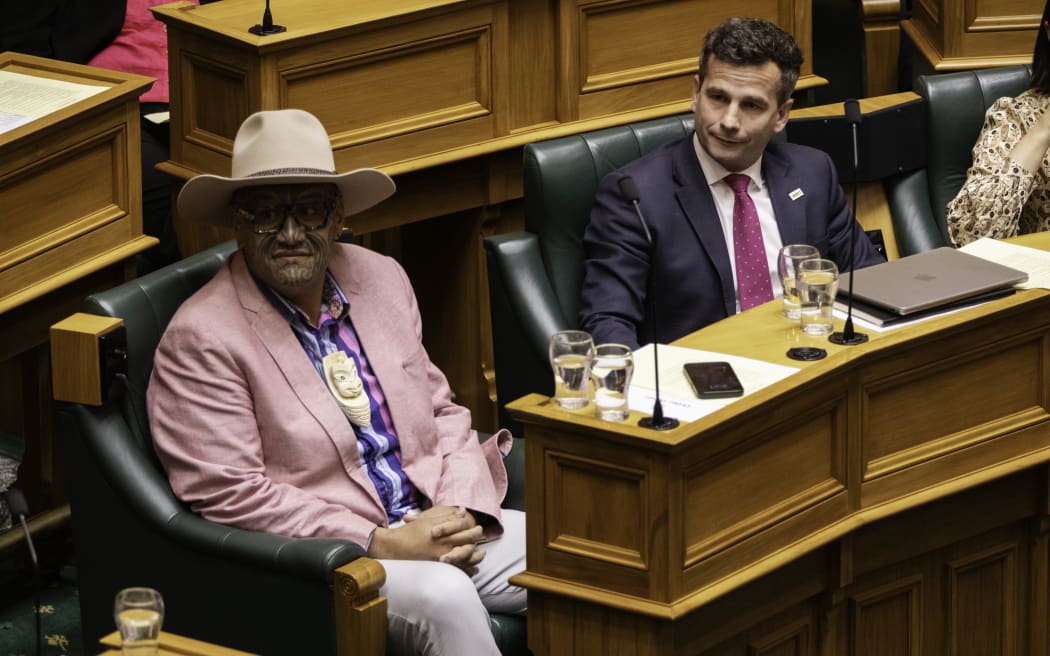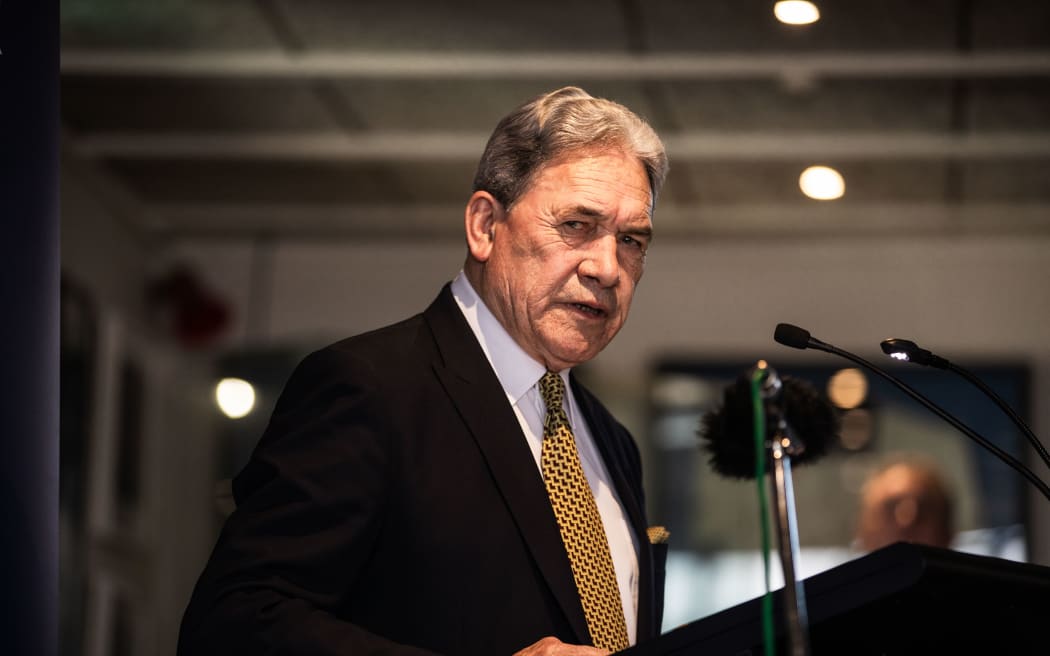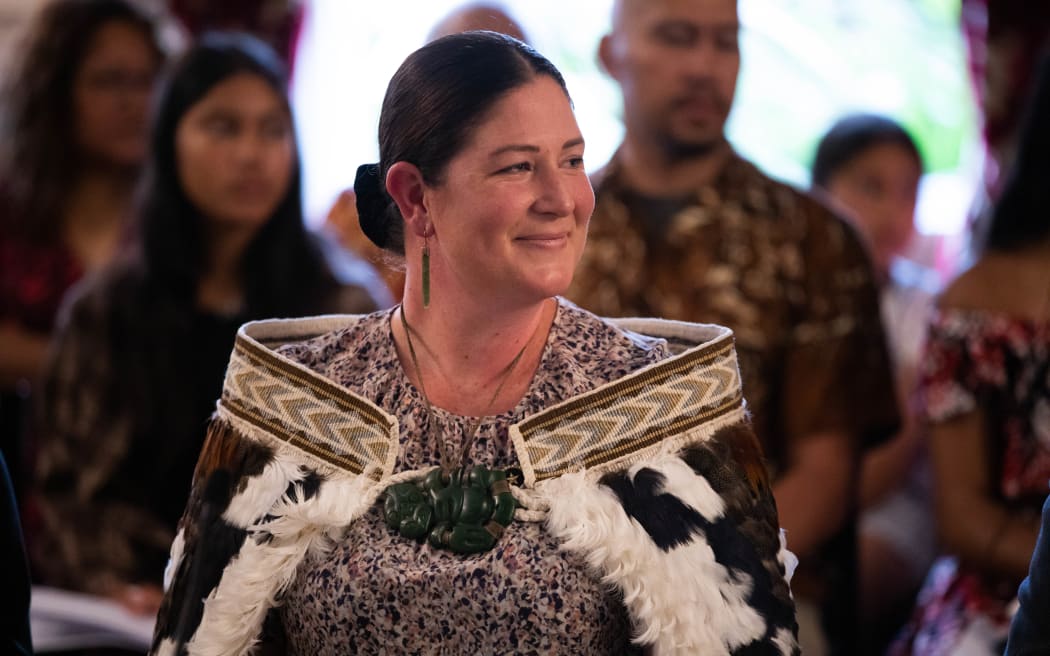
Race was a simmering issue in the election campaign. It has roared into life just as early voting starts. Photo: RNZ
Analysis - Simmering debate over co-governance has boiled over into accusations of racism and "race-baiting" just as voting starts in the 2023 election.
ACT and NZ First were singled out in an open letter signed by 20 Māori leaders late last week. ACT for "race-baiting policies" and NZ First for "racist comments" by some of its candidates.
ACT leader David Seymour responded to the letter by asking which of his party's policies were "race-baiting".
"The letter never says what they are … By misusing such a powerful accusation, they damage its meaning, and make it harder to fight actual racism," Seymour said.
What is race-baiting?
By a strict dictionary definition, "race-baiting" is the act of intentionally encouraging racism or anger about issues related to race in order to win votes.
In reality, the term is highly charged and could rarely be applied without objection.
In 2004, National's then-leader Don Brash embarked upon what many critics considered a campaign of race-baiting. Brash accused the Labour Government of the time of "race-based" policies that unfairly advantaged Māori and advocated "one law for all". It was certainly a potent vote winner - National surged from the high-20s to the mid-40s on political polls within weeks. But was it "intentionally encouraging racism"? Brash, who now runs the lobby group 'Hobson's Pledge', has always insisted he campaigns for the exact opposite of racism.

ACT leader David Seymour (right) sits alongside Te Pāti Māori co-leader Rawiri Waititi in Parliament's debating chamber. Photo: RNZ / Angus Dreaver
Seymour has a similar view. The ACT Party is campaigning for a binding referendum on co-governance. The referendum would propose a law that defines the principles of the Treaty of Waitangi. The legally defined principles would override all other existing legal references to Treaty principles, including those decided by the courts.
The signatories to the open letter had that policy in mind with this statement: "It is ignorant to think you have a right to erase te Tiriti from legislation and rewrite it in your own words." It's clear they view it as race-baiting.
Seymour, though, says the policy only reflects the concern people have about co-governance.
"Labour is trying to make New Zealand an unequal society on purpose. It believes there are two types of New Zealanders. Tangata Whenua, who are here by right, and Tangata Tiriti who are lucky to be here."
Co-governance and race
Lindsey Te Ata O Tu MacDonald (Ngāi Tahu), a lecturer in political science at the University of Canterbury, says the discord comes from the way 'Māori' is used as a generic noun when discussing co-governance. In practice, he says, co-governance happens in a much more nuanced, local way.
"The politicians are using Māori as a signifier for all Māori, whereas in co-governance, it's particular iwi, or Māori organisations who are stakeholders in particular issues the committee is looking at, whether it be a river, whether it be Māori health, and it's those iwi, or Māori organisations that have relationships with the Crown already that are being appointed to those boards."
He gives the example of the government consulting with medical professionals if they were looking at health matters.
"When they [political leaders] say Māori, as though Māori are getting special rights, they are using a racial term, rather than being particularly factual about who's actually getting to sit up on the table," MacDonald says.
Describing co-governance as akin to "apartheid" or "special votes" is like calling it apartheid that only Aucklanders get to vote to elect Auckland City councillors, he says.
He says structures of co-governance are seen across regions in catchment groups, for example, "where farmers appoint various people on them with regional councils and local councils."
Even school boards have co-governance, as they consult with local stakeholders, MacDonald says.
"The point of course, is that only the brown co-governance has been called out by various parties. And so it's really hard not to see those parties calling out people based on their skin colour rather than the interests in making sure that New Zealand gets governed in the interests of everybody."

NZ First leader Winston Peters Photo: RNZ / Samuel Rillstone
Personal attacks
Another signatory to the letter, Manukau Urban Māori Authority chair and Labour Party member Bernie O'Donnell, describes Māori as being "used".
"I'm really disappointed that those two parties [ACT and NZ First] are using us in a way where we've become the collateral damage, around who we are, our identity. Our Treaty rights become a topic of division as opposed to the understanding it was justice that we all sort of went through over the last few generations."
Earlier this year, NZ First Party leader Winston Peters made fun of Te Pāti Māori co-leader Rawiri Waititi's tā moko, describing Waititi as having "scribbles on" and a "cowboy hat on".
"That's a hate-narrative and that shouldn't be coming from Māori," O'Donnell says.
Peters has also defended comments by one of his candidates, Rob Ballantyne, about what he refers to as the "Māori elite".
"Cry if you want to, we don't care. You pushed it too far. We are the party with the cultural mandate and courage to cut out your disease and bury it permanently," Ballantyne said.
Peters said the comment was about co-governance - and one he himself has made many times.
Placing blame
But MacDonald warns words have meaning and the potential to insight violence.
"When you say something, you are creating political action if you are a public politician with a high profile. In the same way that when John Key said 'Jihadi brides', violence against Islamic women went up."
In 2015, as Prime Minister, Sir John Key made false claims about women leaving New Zealand to join ISIS.
In a submission to the Royal Commission of Inquiry into the Christchurch mosque attack, the Islamic Women's Council of New Zealand said the day after Key's comments New Zealand Muslim women and girls experienced harassment, threats and taunting on the streets, in school and workplaces.
"If you are suggesting that Māori are to blame for various things, or any group is to blame, if you suggest women are to blame in a society, you will see violence against them go up, we know that it correlates," MacDonald says. "Which is why people have to be so careful in public positions that they're not using generic nouns."

Hana-Rāwhiti Maipi-Clarke Photo: Erica Sinclair / Supplied
Late last week, 21-year-old Te Pāti Māori candidate Hana-Rāwhiti Maipi-Clarke said there had been a "politically motivated" invasion of her home. In a statement, the party said it was the third incident to take place at her home within a week.
"This escalation of danger is what happens when right wing politicians race bait and fear monger for votes," Te Pāti Māori said. "They have emboldened this type of behaviour. Now it is time we embolden ourselves."
Labour's candidate for Northland, Willow-Jean Prime, says she has faced the "worst comments and vitriol" of any of the seven campaigns she has been through - two in local government and five in central government.
"Whenever I said a te reo Māori word like puku for full tummies, lunches in schools, I was shouted at," she told reporters after a debate in Kerikeri.
"Whenever I said Aotearoa the crowd responded 'It's New Zealand!' When I said rangatahi 'Stop speaking that language!' That is racism coming from the audience."
Prime said the "dog-whistling" present at candidate debates is not evident in the general public.
"What is really worrying is that they feel so emboldened to be able to come out and say this stuff publicly, they don't care that other people that might be in the audience, that might be listening or the impact that has on us as candidates."

Willow-Jean Prime Photo: RNZ / Angus Dreaver
This week, National has also raised concerns about vitriolic and threatening behaviour towards its candidates. Campaign chair Chris Bishop listed examples of incidents including a candidate being forced to move house after a gang threat, death threats made to a volunteer in Auckland, an "allegedly intentional dog attack on a door knocking volunteer, resulting in injuries worthy of medical attention", volunteers being abused and followed by gang members in Hawke's Bay, and a candidate having beer thrown over them with their volunteers intimidated and house broken into.
Civilised debate
Is it still possible to have a respectful, civilised debate about things like co-governance? Or has the temperature simply got too high, at least for now?
Dame Naida Glavish, the first name on the list of signatories to the open letter, is a fierce presence.
Glavish, who is co-chair of Te Rūnanga o Ngāti Whātua and a staunch te reo Māori and health advocate, says she has been appalled by the racist words coming out of the mouths of some of the political leaders during the campaign.
"We agreed that we cannot sit back and allow this outright open racism to continue and that we have a responsibility to our tamariki," she says.
"We have a responsibility to the unborn Māori children to stop this nonsense now, because it's not new. It hasn't just started. It's been there for some time. And it has got to stop in the interest of good relationships and Aotearoa New Zealand."
RNZ asked Glavish several times what specific ACT Party policies were racist, other than the disestablishment of Te Aka Whai ora, the Māori Health Authority, but she wasn't specific.
"I don't have to read his [Seymour's] policies. All I have to do is look at the shape of his mouth. Every time he opens that, he can't help himself, because he so wants to be in Parliament, that he doesn't care whose neck he sticks his foot on, and in particular better still, if it's a brown neck.
"Racism is racism in any English language, whether it's called dog whistling, or whatever it's called. It is racist."
Still, she insists it is possible to debate respectfully. The tone just has to be right and trust between Māori and the Crown needs to grow, Glavish says.


